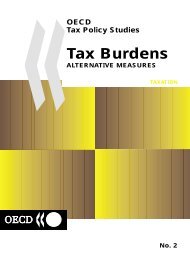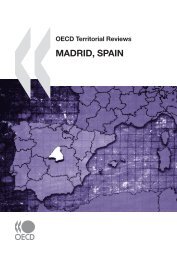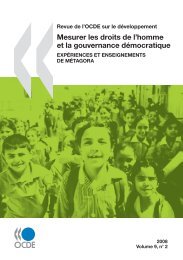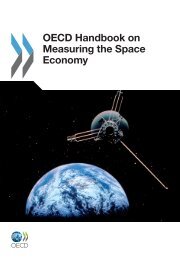Evaluating Country Programmes - OECD Online Bookshop
Evaluating Country Programmes - OECD Online Bookshop
Evaluating Country Programmes - OECD Online Bookshop
You also want an ePaper? Increase the reach of your titles
YUMPU automatically turns print PDFs into web optimized ePapers that Google loves.
Chapter 5<br />
<strong>Country</strong> Assistance Evaluation<br />
in the Multilateral Development Banks:<br />
Approaches, Instruments and Emerging Practices<br />
<strong>OECD</strong> 1999<br />
by the Multilateral Development Banks –<br />
Evaluation Co-operation Group<br />
Introduction and questions on country assistance evaluation<br />
Most multilateral development banks (MDBs) have been making, and are continuing<br />
to make, considerable efforts to develop country strategies and programmes.<br />
This has not been the case for country assistance evaluation. The World Bank has<br />
taken the lead in this area, having completed 20 studies. The Inter-American Development<br />
Bank (IDB) has completed two pilot studies and the Asian Development<br />
Bank (AsDB) has recently completed its first study. The European Bank for Reconstruction<br />
and Development (EBRD), International Finance Co-operation (IFC) and<br />
African Development Bank (AfDB) have not yet begun the preparation of studies, but<br />
intend to do so in the foreseeable future.<br />
One of the first questions to address is whether institutions should undertake potentially<br />
costly country strategy/programme/assistance evaluations. At the 1994 DAC seminar on<br />
country programme evaluation (CPE), participants debated the purpose and usefulness<br />
of such exercises. For some agencies the purpose of the evaluation was to contribute<br />
to the examination and reorientation of co-operation policies independent of<br />
the outcome of projects. Others saw the evaluation as supplying answers to questions<br />
of results, cost-effectiveness and efficiency of ongoing projects on a cumulative basis.<br />
Others still questioned the usefulness of the exercise arguing that country evaluation<br />
fell short of sufficient detail on aid effectiveness to deliver a meaningful product. In a<br />
survey conducted at the seminar, the majority of participants considered that the CPE<br />
provided valuable lessons to improve future aid performance but some questioned<br />
whether it was worth the cost.<br />
Participants agreed that the starting point to country evaluations should be a<br />
formalised country strategy or programme. In the past, country strategies have<br />
often been intentionally formulated with very broad objectives and limited<br />
145

















![CQE=U]^\]Z: KAZAKHSTAN - OECD Online Bookshop](https://img.yumpu.com/3915768/1/190x253/cqeuz-kazakhstan-oecd-online-bookshop.jpg?quality=85)